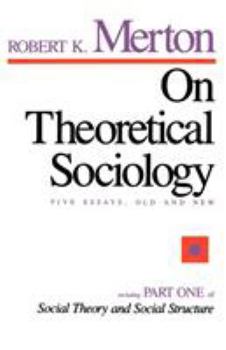On Theoretical Sociology: Five Essays, Old and New
Select Format
Select Condition 
Book Overview
No Synopsis Available.
Format:Paperback
Language:English
ISBN:0029211506
ISBN13:9780029211502
Release Date:October 1967
Publisher:Free Press
Length:180 Pages
Weight:0.55 lbs.
Dimensions:0.5" x 5.4" x 8.6"
Customer Reviews
2 ratings
Respecting the Masters.
Published by Thriftbooks.com User , 15 years ago
Robert Merton divides this book into five chapters. Chapters three through five are taken from part one of his previous works titled, "Social Theory and Social Structure". Chapters one and two have been added to this previous work to attempt to better explain sociological theory and its connection to its past as a prerequisite to any future gains of knowledge within the filed of sociology. The book primarily addresses the distinct differences between the study of sociology and the study of sociological history and theory. Merton states that this division has caused many problems related to gaining new knowledge. There seems to be an antagonistic existence between sociological historians and researchers. He states that the historians are concerned with protecting the ancient sociological masters from plagiarism by modern sociological researchers. This division is harmful to the field in that the social sciences must rely on past knowledge to create new knowledge. He states that knowledge within the social sciences is gained incrementally rather than at all once. The hard sciences rely on only modern theory to apply their skills to gain new knowledge. The humanities such as literature rely on the ancient ones primarily to gain new knowledge. The examples used are of science and literature. One would surely not use ancient theory in science to study modern phenomenon such as human genetics. The opposite could be said when studying literature. One would need to study the ancient greats of literature to form the necessary basic knowledge to further one's understanding of literature, (e.g. Shakespeare). Sociology falls in between these two examples. Merton feels that one cannot study sociological theory without having a thorough understanding of its history. One must build upon past achievements and failures to gain new knowledge in the field of sociology. The biggest problem with achieving new knowledge is the amount of criticism levied onto its creator. The protectors of the ancient masters, the sociological historians, feel nostalgia about their masters and take offense to new researchers claim to new theory. They will attack the new theory as having no originality through the use of matching words to ancient text or theory, however this wrong according to Merton. I agree that it is wrong in that comparing words from one author to another without first distinguishing the meaning or concept behind the word is "spinning" the truth. I understand Merton to be comparing the researcher with the historian as one that seeks to gain knowledge with one that seeks to gain victory or prestige. This could compare to ancient philosophy in that it was the Sophists that used language to battle rather than to gain new knowledge. Merton termed this as Adumbrationism or "the denigrating of new ideas by pretending to find them old". A clear example of this was Sorokin's berating of Marx and Engel as being without originality and that their theories were completel
Excellent overview of social structures
Published by Thriftbooks.com User , 20 years ago
Great introduction to the functional analysis of social structures. Merton has written important essays introducing students and scholars to contemporary sociology.Easy to understand -- yet written at a high intellectual level.





